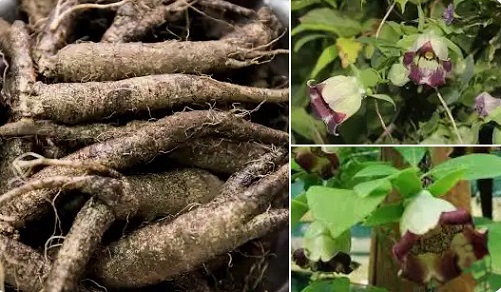Herbs And Phytochemicals: Fermented Codonopsis lanceolata Root Extract Shows Promise Against Influenza A Virus
Nikhil Prasad Fact checked by:Thailand Medical News Team Jun 22, 2024 1 year, 7 months, 3 weeks, 3 days, 16 hours, 57 minutes ago
Herbs And Phytochemicals: Codonopsis lanceolata, often referred to as "poor man’s ginseng," has been a staple in traditional Asian medicine for treating respiratory ailments such as bronchitis and cough. Recent research has uncovered new benefits of this herbal root, particularly when it is fermented. This
Herbs And Phytochemicals study, conducted by researchers at the Korea Atomic Energy Research Institute and Kongju National University in South Korea, explores the antiviral properties of fermented Codonopsis lanceolata root extract (FCLE) against the influenza A virus (IAV).
 Fermented Codonopsis lanceolata Root Extract Shows Promise Against Influenza A Virus
What is Codonopsis Lanceolata?
Fermented Codonopsis lanceolata Root Extract Shows Promise Against Influenza A Virus
What is Codonopsis Lanceolata?
Codonopsis lanceolata is highly regarded in traditional Asian medicine across Korea, China, and Japan. Known for its ginseng-like roots, it is used in various forms in culinary practices and herbal remedies. The roots contain a rich array of bioactive compounds, including saponins, polyphenols, polyacetylenes, alkaloids, and polysaccharides. Among these, saponins are particularly noted for their immune-enhancing properties.
Fermentation Enhances Benefits
The process of fermentation, which involves beneficial microbes like Bifidobacterium and Lactobacillus, significantly enhances the bioavailability and efficacy of these compounds. Fermentation alters the molecular structure of saponins and other phytochemicals, making them more easily absorbed by the body. This study found that the fermented version of Codonopsis lanceolata (FCLE) showed higher levels of antioxidants, polyphenols, and saponins compared to the non-fermented version (CLE).
Fighting the Influenza A Virus
Influenza A is a highly contagious respiratory virus known for causing seasonal epidemics and pandemics. The virus can rapidly mutate, making it challenging to develop effective vaccines and treatments. Traditional antiviral drugs like Tamiflu are becoming less effective due to increasing drug resistance. This has led to a growing interest in alternative treatments, such as nutraceuticals and natural products.
Key Findings of the Study
The research conducted on FCLE demonstrated its significant antiviral properties. The study involved both in vitro (test tube) and in vivo (live animal) models. Here are some of the key findings:
-Increased Antioxidant Activity: FCLE showed significantly higher antioxidant activity compared to CLE, with an increase in total polyphenols and saponins.
-Reduced Viral Replication: FCLE effectively reduced the cytopathic effects (cell damage) caused by the influenza virus in cultured cells. It also lowered the virus titer, which is a measure of the concentration of the virus.
-Inhibition of Neuraminidase Activity: Neuraminidase is an enzyme that
helps the virus spread from infected cells to healthy ones. FCLE strongly inhibited this enzyme, thereby reducing the virus's ability to propagate.
-Improved Survival Rates in Mice: In animal models, oral administration of FCLE at 100 mg/kg protected mice from a lethal dose of the influenza virus. The treated mice showed a 100% survival rate, reduced viral load, and less lung inflammation.
Potential for Human Use
The findings suggest that FCLE could be a promising natural remedy for treating and preventing influenza A virus infections. Its dual action - directly inhibiting viral replication and boosting the immune response - makes it an effective tool against the flu. Given the increasing resistance to traditional antiviral drugs, FCLE offers a valuable alternative.
Conclusion: A Promising Nutraceutical
This study underscores the potential of fermented Codonopsis lanceolata root extract as a powerful antiviral agent. Its ability to enhance antioxidant levels, reduce viral replication, and protect against severe influenza infection positions FCLE as a promising nutraceutical ingredient for respiratory health. As interest in natural and alternative medicines grows, FCLE could become a key player in the fight against viral infections, providing a natural, effective, and accessible treatment option.
The study findings were published in the peer reviewed journal: Food Bioscience.
https://www.sciencedirect.com/science/article/abs/pii/S2212429224010472
For the latest on
Herbs And Phytochemicals, keep on logging to Thailand Medical News.
Read Also:
https://www.thailandmedical.news/news/herbs-and-phytochemicals-artemisia-derived-nanovesicles-mitigates-lung-tissue-damage-caused-by-sars-cov-2-and-flu-viruses
https://www.thailandmedical.news/news/herbs-and-phytochemicals-griffithsin-a-lectin-derived-from-the-red-algae-is-able-to-inhibit-influenza-a-and-sars-cov-2-viruses
